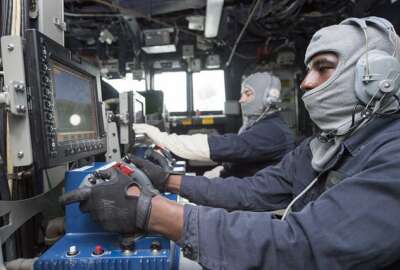To listen to the Federal Newscast on your phone or mobile device, subscribe on PodcastOne or Apple Podcasts. The best listening experience on desktop can be found using Chrome, Firefox or Safari.
- The Coast Guard said it needs upgraded ships, planes, helicopters and drones to compete in the Arctic. A new strategy released by the service comes amid concerns about increased activity by China and Russia in the region. The area has become more contested as the ice caps have melted and more resources have emerged. (U.S. Coast Guard)
- The Coast Guard will also finally get one of the ships it said it has needed for a long time. The Naval Sea Systems Command awards VT Halter Marine of Pascagoula, Mississippi a contract to build a new heavy icebreaker. The Polar Security Cutter will cost $746 million under a fixed-price, incentive-firm contract. Lifecycle options could bring the program cost to nearly $2 billion. VT Halter is a subsidiary of Singapore Technologies Engineering. A recent USCG analysis warned the Arctic’s shrinking ice makes it strategically vulnerable. (Defense Department)
- While the Navy has made plans to shore up its pilot shortage by 2023, more problems may arise in the future. New analysis from the Defense Department said one of them could be the commercial pilot shortage peaking at the same time, causing the Navy to have to compete for talent. Additionally, the Navy will have an instructor shortage in that timeframe. The service is taking action now with new programs to prepare for the instructor gap. (Federal News Network)
- Acting Defense Secretary Patrick Shanahan appointed a new director for the Defense Digital Service. Chicago professor and former Navy advisor Brett Goldstein will take over the DDS sometime this week. Goldstein replaced founding director Chris Lynch, who is returning to the private sector. Shanahan said it is Goldstein’s public and private sector knowledge, technical expertise and commitment to improving government through technology that makes him right for the position. (Federal News Network)
- DoD is struggling to manage all of its back-office data so it’s turning to the cloud for some help. The Pentagon’s chief management officer will face a data deluge as it continues its administrative reform efforts. The CMO asked for some help in the form of a software-as-a-service data analysis tool. The CMO issued a draft statement of work seeking vendor input on its plans for a possible contract. The draft statement called for a web-based data-mining SaaS platform with data delivery and analysis services. DoD said the tool must provide on-demand and accurate decision-grade information to leaders across the defense enterprise to further reduce cost, increase speed and improve performance. (FedBizOpps)
- The Air Force said it’s making major progress in weeding out outdated paperwork exercises. In a memo first reported by Stars and Stripes, the Air Force’s secretary and chief of staff said they’ve eliminated a total of 328 Air Force Instructions over the past two years. Another 450 documents have been revised to get rid of unnecessary tasks for airmen. Officials said the stack of paperwork that’s been eliminated now weighs 75 pounds, and that it will keep growing: another 180 instructions are on the list to be rescinded in the coming months.
- Acting Transportation Security Administration head Patricia Cogswell said the agency’s fiscal 2020 budget request zeroes out some programs, in order to save others from receiving cuts. Programs getting trimmed include TSA’s Visible Intermodal Prevention and Response or VIPR teams, as well as cuts to TSA staffing at airport exit lanes. Despite the program cuts, the TSA’s top-line budget remains flat at nearly $7.8 billion. (Federal News Network)
- A second round of applications for the Cybersecurity Reskilling Academy is now open. The CIO Council will accept applications to join the academy’s second cohort through May 15. Applicants will be asked to take two online assessments between now and May 22. The council will choose participants by early June. Eight weeks of classroom training will run from July through September. The second cohort is open to all federal employees this time, including those with IT backgrounds. (Federal News Network)
- Updated guidance for agencies to make sure mobile applications are secure. The National Institute of Standards and Technology’s Special Publication 800-163 Revision One detailed and refined the current app vetting model by better defining the roles and processes that affect the security analysis. The new publication also described how vulnerabilities can be identified and weighted based on existing standards and best practices. This is the first time in four years that NIST updated its guidance for mobile application vetting. (National Institute of Standards and Technology)
- Many employees at the Department of Homeland Security found recent leadership changes unsettling, but still feel they won’t have much of a day-to-day impact. Around 81% of DHS employees who took a Federal News Network survey said they’re worried by recent changes, but a clear majority of 69% said the leadership shakeups have no impact on their daily work at all. The department has at least a dozen top leadership spots vacant or held by acting officials. (Federal News Network)
- The General Services Administration has made plans to test several building technology innovations at some of its facilities later this year. One pilot for a Connected Building Operating System, will to provide real-time recommendations to a building heating and cooling systems, to make them more efficient. Another program looks to test on-site energy generation through microgrid technology. As part of its Proving Ground program, GSA will work with third-party evaluators to test these tools which are not yet available as commercial technology. (General Services Administration)
Copyright
© 2024 Federal News Network. All rights reserved. This website is not intended for users located within the European Economic Area.
